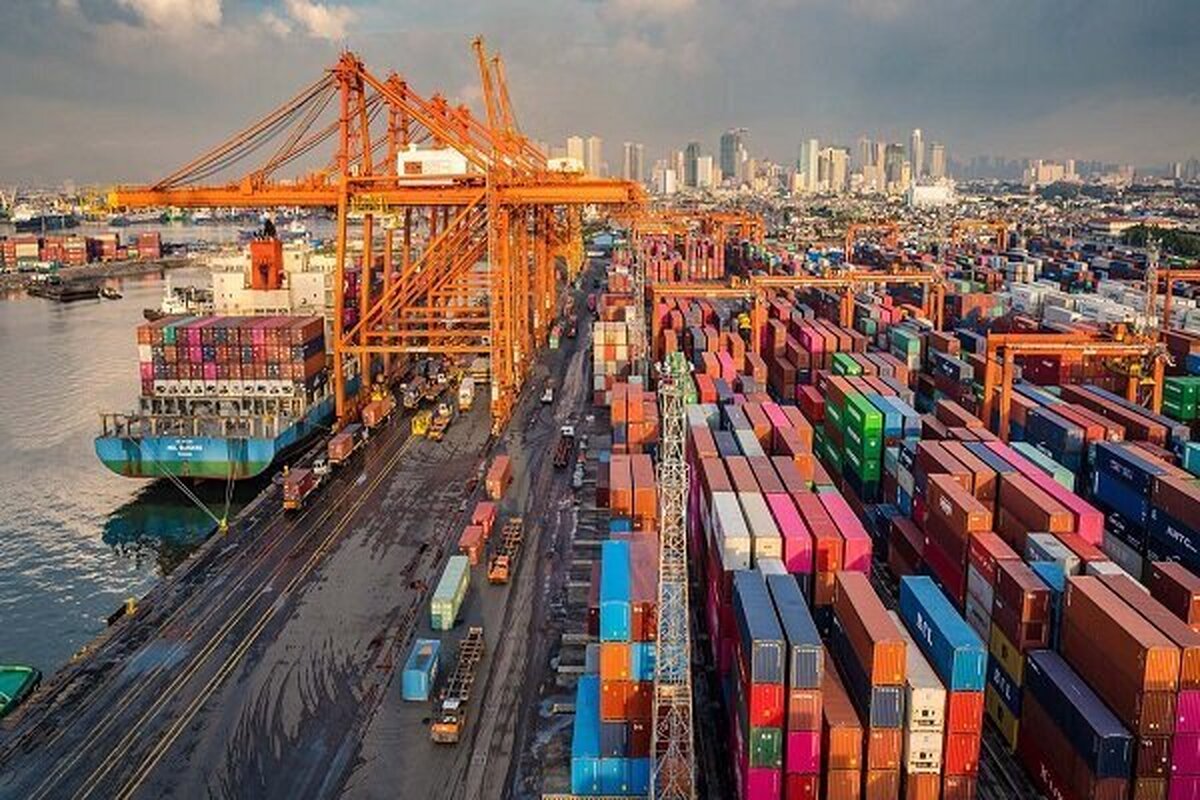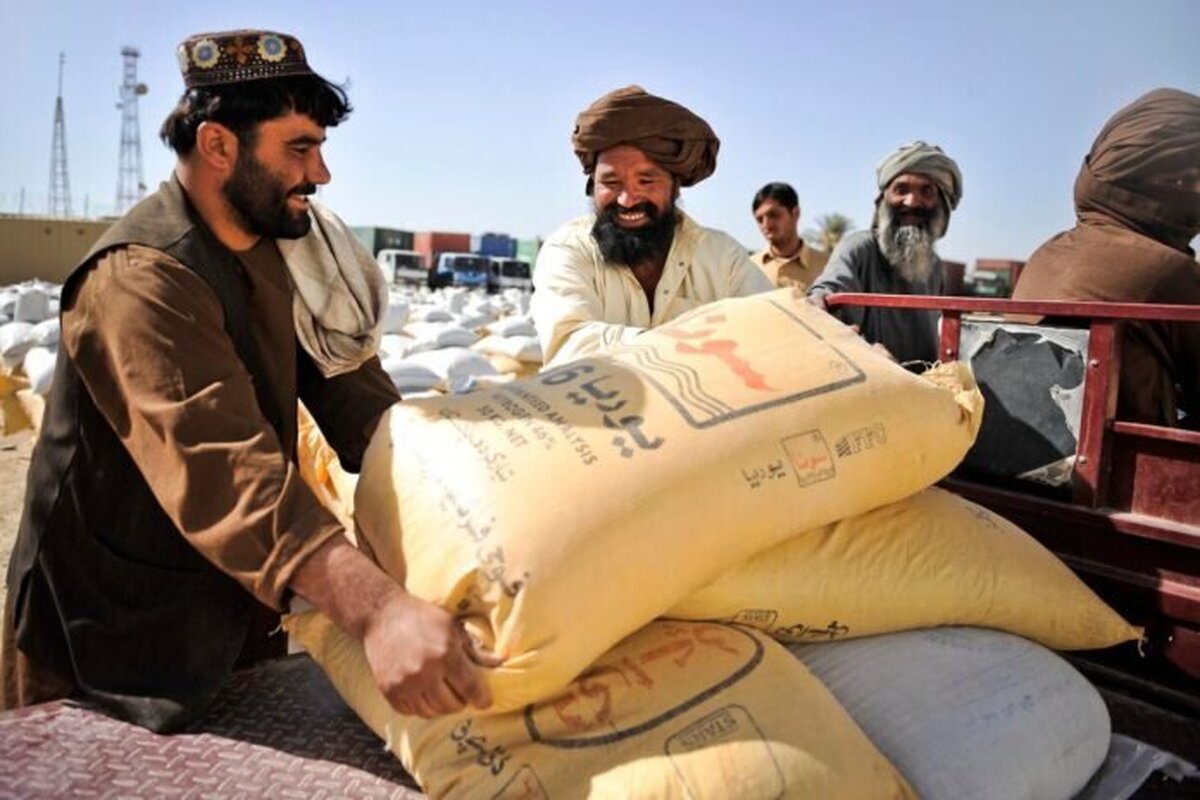
Taliban Offensive Closes Iran's Main Trade Gateway With Afghanistan
EghtesadOnline: Due to political turmoil in Afghanistan and the Taliban’s advance to Nimruz Province neighboring Iran’s Sistan-Baluchestan Province’s Hirmand County, Milak border crossing in this county (known as Zaranj on the Afghan side) has been temporarily closed down.
Milak is the main trade gateway between Iran and Afghanistan.
According to Ayyoub Kord, director general of Sistan-Baluchestan Road Maintenance and Transportation Organization, the closure has been enforced since August 5. He has communicated the measure to his counterparts in all Iranian provinces, informing transportation and commercial officials that no export or transit via trucks will be conducted through Milak until further notice, Mehr News Agency reported.
Kord noted that Sistan-Baluchestan’s Traffic Police will prevent the commute of Iranian trucks to Afghanistan through this southeastern border crossing.
Teymour Baqeri, the deputy head of Sistan-Baluchestan’s Road Maintenance and Transportation Organization, told the news portal of the Ministry of Roads and Urban Development that Iranian trucks carrying commercial commodities on their way back from Afghanistan can return through Milak.
Rouhollah Latifi, spokesperson of the Islamic Republic of Iran Customs Administration, also said trade via Milak customs office and Gamshad border market are banned until further notice, Iribnews.ir reported.
In July, trade via two other checkpoints between Iran and Afghanistan, namely Sheikh Abu Nasr Farahi Customs (known as Mahiroud on the Iranian side) and Islam Qala border crossing (Dogharoun), came to a halt after the Taliban seized control.
Latifi said on Saturday Mahiroud and Dogharoun border crossings have reopened and are currently active.
“Although Dogharoun has been operating for about a month now, trade via this checkpoint has seen a 50% decline YOY since it reopened. Meanwhile, trade from Mahiroud has experienced a 50% increase compared with the similar period of last year, but long queues of trucks have formed at the Iranian side of the border,” the official was quoted by ILNA as saying.
“What concerns us is that the future direction of Iran-Afghanistan trade is in no way predictable, if the Taliban’s control over the country continues,” says Hossein Salimi, chairman of Iran-Afghanistan Chamber of Commerce.
Exports to Afghanistan stood at 1.8 million tons worth $728 million in the first four months of the current fiscal year (March 21-July 22), registering a 15% decline in terms of weight and 2% growth in terms of value compared with the corresponding period of last year, according to the IRICA spokesperson.
Iron and steel rods, some agricultural products and foodstuff are among the main products exported from Iran to the neighboring country.
“Afghanistan was Iran's fourth largest export destination among neighboring countries and fifth among world countries in the fiscal 2020-21 [ended March 20],” Iran’s former commercial attaché to Afghanistan, Mohammad Mehdi Javanmard-Qassab, has been quoted as saying by Fars News Agency.
Deteriorating Security in Afghanistan
Taliban insurgents captured an Afghan provincial capital and killed the government's senior media officer in Kabul on Friday amid a deteriorating security situation as US and other foreign troops withdraw, Reuters reported.
A police spokesman in southern Nimruz Province said the capital Zaranj had fallen to the insurgents because of a lack of reinforcements from the Western-backed government.
A Taliban spokesman said on Twitter that the insurgents had "completely liberated" the province and had taken control of the governor's house, police headquarters and other official buildings.
Later, a top Afghan general leading the counter-offensive in the south of the country said Afghan air force airstrikes had killed the Taliban's top official for Nimruz along with 14 of his men. Reuters was unable to immediately verify the claim by General Sami Sadat, commander of the 215 Maiwand Afghan Army Corps, on Twitter.
The Taliban have intensified their campaign to defeat the government. The insurgents have taken dozens of districts and border crossings in recent months and put pressure on several provincial capitals, including Herat in the west and Kandahar in the south, as foreign forces pull out.
In New York, UN special envoy for Afghanistan, Deborah Lyons, questioned the Taliban's commitment to a political settlement, telling the UN Security Council that the war had entered a deadlier and more destructive phase "reminiscent of Syria, recently, or Sarajevo, in the not-so-distant past".
Russia's UN Ambassador Vassily Nebenzia said the prospect of Afghanistan slipping into full-scale and protracted civil war "is a stark reality".
Zaranj was the first provincial capital to fall to the Taliban since the United States reached a deal with it in February 2020 for a US troop pullout.
A local source said the Taliban had seized the governor's office, the police headquarters and an encampment near the Iranian border.
Taliban sources said the group was celebrating and Zaranj's fall would lift the morale of their fighters. A Taliban commander, speaking on condition of anonymity, said Zaranj has strategic importance as it is on the border with Iran.
Elsewhere, Taliban fighters stepped up clashes with Afghan forces and attacked militias allied with the government, officials said, stretching their dominance of border towns.
At least 10 Afghan soldiers and a commander of armed members belonging to the Abdul Rashid Dostum militia group in the northern province of Jowzjan were killed.
Abdul Qader Malia, the deputy governor of Jowzjan, said the Taliban attacked the outskirts of provincial capital Sheberghan this week.
Implications on Investment
The conflict in the neighboring country may also affect Iran’s plans to invest there.
Preliminary agreements have been reached for Iran to invest a total of $5.3 billion in Afghanistan’s road and rail transportation infrastructure as well as in the neighboring country’s housing, according to an advisor to Minister of Roads and Urban Development.
“We are now negotiating project details and selecting the companies that will be undertaking these projects,” Hossein Mirshafi has also been quoted by Mehr News Agency as saying.
Mirshafi noted that Iran has officially announced its readiness to cover the $2.2 billion investments required for the construction and completion of 656-kilometer-long Herat-Mazar-i-Sharif railroad.
“Negotiations are underway for Iran to invest at least $3.1 billion on road construction, road transportation infrastructure and technical and engineering services in Afghanistan,” he added.
Mirshafi said the draft of a memorandum of understanding has been prepared by the two sides for Iran to invest in its eastern neighbor’s housing sector by constructing 5,000 to 10,000 homes in the new cities of Afghanistan.
Once the agreement has been finalized, these homes will be built in cooperation with Afghan companies using Iranian investments.
Human Smuggling, Migration on the Rise
Personnel members of the Islamic Republic of Iran Customs Administration have arrested 918 individuals in human smuggling attempts since March 21 to August 1.
According to IRICA spokesperson, the arrested, who are mostly Afghan nationals, were trying to enter Turkey illegally via Bazargan border crossing in West Azarbaijan Province, located in northwestern Iran.
The number of detained illegal migrants during the period under review is as many as those in the year ending March 2020 and threefold more in the last Iranian year (March 2020-21), he added.
“A total of 182 illegal migrants were arrested in the month ending April 20, 252 people in the month ending May 21, 67 people in the month ending June 21, 271 people in the month ending July 22 and 146 illegal migrants were taken into custody from July 23 to August 1,” he was quoted as saying by Mehr News Agency.
Officials from the Turkish Interior Ministry said authorities detained 73 Afghans on July 17 in the eastern province of Van, while another 60 migrants, of whom 59 were Afghans, were detained in Van's Ercis district on July 18.
Turkey has taken additional security measures on its border with Iran following developments in Afghanistan that could possibly create a fresh influx of migrants, Turkish newspaper Hurriyet wrote on July 27.
“Additional measures have been taken recently on the border over possible developments on the Iranian border and our border has been reinforced with troops and security systems. We are continuing to work in coordination with the relevant ministries and institutions, especially our interior ministry,” Turkish Defense Minister Hulusi Akar said on July 26.
With the Taliban gaining power in Afghanistan, Turkey is one of the destinations for Afghan people and the number of Afghans fleeing to the country for survival is increasing day by day. Turkey has intensified the work of border security wall, particularly on the eastern border in Van with Iran.
Modular wall and smart tower works are underway on the Iranian border of the eastern province of Van’s Çaldiran district, extending to Dogubayazit and the Yuksekova line of the southeastern province of Hakkari, Anadolu Agency reported recently.
The Emergency Border Security Systems Project was launched on the 63.1 kilometer section of the northeastern line of the border of Van Province.
While the three-kilometer part of the modular wall works to be built on the 63-kilometer line within the boundaries of Çaldiran district has been completed, trench digging works continue in parallel with the firewall.
Some 110 kilometers of trenches were dug, 76 monoblock and lego towers were built and the construction work of 103 electro-optical towers continues to make the border safer, the agency reported.
It is aimed at providing uninterrupted and effective surveillance of the borderline, where security forces also carry out demining activities, thanks to the observation and communication towers and command and control centers.
“Our administrative procedures continue resolutely at the point of trenching activities for preventing all kinds of smuggling, especially terrorism and illegal immigration, ensuring the border security and establishing peace for citizens, and the construction of optical towers produced by ASELSAN,” Çaldiran Governor Yusuf Durani Dinç told the agency.
“Illegal migration due to both the internal turmoil in Afghanistan and the instability of some countries is reflected on Turkey from time to time,” Denç added, noting that especially the Turkish Armed Forces are making an intense effort to ensure the security of the borders.
“We are taking the necessary action against migrants who try to infiltrate our borders, both within the scope of our judicial and administrative procedures. We provide referrals to removal centers for them to return to their countries,” he stated.
Turkey and Iran are most affected by the migration problem caused by increasing tensions caused by the advance of the Taliban in Afghanistan, Turkish Parliament Speaker Mustafa Sentop stated on Thursday.
Speaking during a meeting with Iranian Parliament Speaker Mohammad Baqer Qalibaf in an official visit to the country, Sentop underlined that the migration problem and instability in Afghanistan is a common problem of Muslim countries, Daily Sabah reported.
“We have to increase our cooperation to ensure stability and stop the migration wave from Afghanistan.”
Concerns over a possible spike in migrants from Afghanistan have risen.
Video footage has shown large groups of migrants in the border area with Iran, although the Turkish government says there has been no surge yet in numbers.
The United Nations recently estimated half of Afghanistan's 39 million people is in need of aid, and called on the international community to maintain financial support for the country.
The Turkish defense minister said last week that surveillance at the Iranian border had been increased with additional troops, among other measures.
Many of the migrants arriving via Iran are heading for Istanbul to find work or passage to another coastal city from which to embark for Europe.
Turkish President Recep Tayyip Erdogan has said Turkish officials were holding high-level talks over the issue with Afghan counterparts.
The issue is also likely to feature in talks between Ankara and Brussels about updating a 2016 deal under which Turkey received aid for hosting migrants seeking refuge in the European Union.




